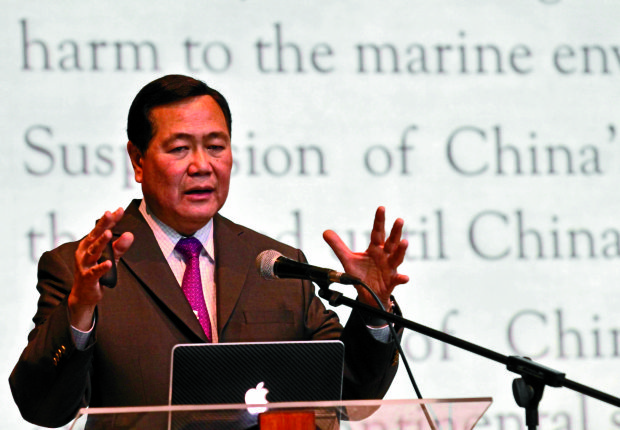China may sign a code of conduct for all claimants in the South China Sea only after it has built military facilities on Panatag Shoal, according to Supreme Court Senior Associate Justice Antonio Carpio.
Speaking at a maritime security symposium in Manila on Wednesday, Carpio said China apparently was hesitant to sign a code of conduct because it had plans to develop Panatag, a rich fishing ground off Zambales province internationally known as Scarborough Shoal.
The Association of Southeast Asian Nations (Asean) is working out a code of conduct with China to prevent rival claims in the South China Sea from erupting into conflict.
Ban on development
Carpio said such a code might ban the development of military facilities on contested islands.
“[That’s probably why] China does not want to sign yet. [T]hey have not completed their reclamation,” he said.
“They might reclaim Scarborough Shoal, put up a facility, and after that they’re ready to sign a code of conduct,” he added.
Vice Adm. Ronald Mercado, the Philippine Navy chief, said a code of conduct would “deescalate the situation” in the South China Sea.
“So we are hoping that we really come up with a code of conduct. It is a mechanism that will deescalate any situation that will arise in the disputed waters,” Mercado said.
Carpio said that having a code of conduct would help manage the dispute and “prevent a shooting war.”
Law of the sea
“What we should avoid in a code of conduct is another dispute settlement mechanism because the dispute settlement mechanism on maritime issues is already there in Unclos,” Carpio said, referring to the United Nations Convention on the Law of the Sea.
“It has been invented a long time ago, in 1982. The dispute settlement mechanism in Unclos is very good for us. It’s neural for all countries. Big powers cannot dominate. They are treated as equal with small countries so we should not touch that anymore. We’ve won because of that,” Carpio said.


